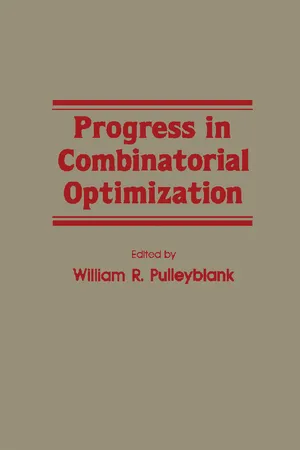
- 386 pages
- English
- PDF
- Available on iOS & Android
Progress in Combinatorial Optimization
About this book
Progress in Combinatorial Optimization provides information pertinent to the fundamental aspects of combinatorial optimization. This book discusses how to determine whether or not a particular structure exists. Organized into 21 chapters, this book begins with an overview of a polar characterization of facets of polyhedra obtained by lifting facets of lower dimensional polyhedra. This text then discusses how to obtain bounds on the value of the objective in a graph partitioning problem in terms of spectral information about the graph. Other chapters consider the notion of a triangulation of an oriented matroid and show that oriented matroid triangulation yield triangulations of the underlying polytopes. This book discusses as well the selected results and problems on perfect ad imperfect graphs. The final chapter deals with the weighted parity problem for gammoids, which can be reduced to the weighted graphic matching problem. This book is a valuable resource for mathematicians and research workers.
Tools to learn more effectively

Saving Books

Keyword Search

Annotating Text

Listen to it instead
Information
Table of contents
- Front Cover
- Progress in Combinatorial Optimization
- Copyright Page
- Table of Contents
- CONTRIBUTORS
- PREFACE
- ACKNOWLEDGMENTS
- Chapter 1. Lifting the Facets of Polyhedra
- Chapter 2. Partitioning, Spectra and Linear Programming
- Chapter 3. Oriented Matroids and Triangulations of Convex Polytopes
- Chapter 4. Recent Algorithms for Two Versions of Graph Realization and Remarks on Applications to Linear Programming
- Chapter 5. Polynomial Algorithm to Recognize a Meyniel Graph
- Chapter 6. Integer Programming Problems for Which a Simple Rounding Type Algorithm Works
- Chapter 7. Notes on Perfect Graphs
- Chapter 8. Total Dual Integrality of Linear Inequality Systems
- Chapter 9. Numbers of Lengths for Representations of Interval Orders
- Chapter 10. Submodular Flows
- Chapter 11. Geometric Methods in Combinatorial Optimization
- Chapter 12. A Fast Algorithm that makes Matrices Optimally Sparse
- Chapter 13. Structural Theory for the Combinatorial Systems Characterized by Submodular Functions
- Chapter 14. Greedoids - A Structural Framework for the Greedy Algorithm
- Chapter 15. Preemptive Scheduling of Uniform Machines Subject to Release Dates
- Chapter 16. An Application of Matroid Polyhedral Theory to Unit-Execution Time, Tree-Precedence Job Scheduling
- Chapter 17. Some Problems on Dynamic/Periodic Graphs
- Chapter 18. Polytopes and Complexity
- Chapter 19. Statics and Electric Network Theory: a Unifying Role of Matroids
- Chapter 20. Total Dual Integrality from Directed Graphs, Crossing Families, and Sub- and Supermodular Functions
- Chapter 21. Solving the Weighted Parity Problem for Gammoids by Reduction to Graphic Matching
Frequently asked questions
- Essential is ideal for learners and professionals who enjoy exploring a wide range of subjects. Access the Essential Library with 800,000+ trusted titles and best-sellers across business, personal growth, and the humanities. Includes unlimited reading time and Standard Read Aloud voice.
- Complete: Perfect for advanced learners and researchers needing full, unrestricted access. Unlock 1.4M+ books across hundreds of subjects, including academic and specialized titles. The Complete Plan also includes advanced features like Premium Read Aloud and Research Assistant.
Please note we cannot support devices running on iOS 13 and Android 7 or earlier. Learn more about using the app